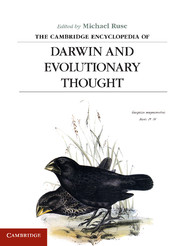Book contents
- Frontmatter
- Contents
- Contributors
- Preface
- Acknowledgments
- Introduction
- 1 Origins and the Greeks
- 2 Evolution before Darwin
- 3 Charles Darwin’s Geology
- 4 Looking Back with “Great Satisfaction” on Charles Darwin’s Vertebrate Paleontology
- 5 The Origins of the Origin
- 6 Darwin and Taxonomy
- 7 Darwin and the Barnacles
- 8 The Analogy between Artificial and Natural Selection
- 9 The Origin of Species
- 10 Sexual Selection
- 11 Darwin and Species
- 12 Darwin and Heredity
- 13 Darwin and Time
- 14 Darwin’s Evolutionary Botany
- 15 Mimicry and Camouflage
- 16 Chance and Design
- 17 Darwin and Teleology
- 18 The Evolution of the Origin (1859–1872)
- 19 Alfred Russel Wallace
- 20 Darwin and Humans
- 21 Darwin and Language
- 22 Darwin and Ethics
- 23 Social Darwinism
- 24 Darwin and the Levels of Selection
- 25 Darwin and Religion
- 26 Darwinism in Britain
- 27 Darwinism in the United States, 1859–1930
- 28 The German Reception of Darwin’s Theory, 1860–1945
- 29 Darwin and Darwinism in France before 1900
- 30 Encountering Darwin and Creating Darwinism in China
- 31 Darwinism in Latin America
- 32 Botany
- 33 Population Genetics
- 34 Synthesis Period in Evolutionary Studies
- 35 Ecological Genetics
- 36 Darwin and Darwinism in France after 1900
- 37 Botany and the Evolutionary Synthesis, 1920–1950
- 38 The Emergence of Life on Earth and the Darwinian Revolution
- 39 The Evolution of the Testing of Evolution
- 40 Mimicry and Camouflage
- 41 The Tree of Life
- 42 Sociobiology
- 43 Evolutionary Paleontology
- 44 Darwin and Geography
- 45 Darwin and the Finches
- 46 Developmental Evolution
- 47 Darwin’s Evolutionary Ecology
- 48 Darwin and the Environment
- 49 Molecular Biology
- 50 Challenging Darwinism
- 51 Human Evolution after Darwin
- 52 Language Evolution since Darwin
- 53 Cultural Evolution
- 54 Literature
- 55 Darwin and Gender
- 56 Evolutionary Epistemology
- 57 Ethics after Darwin
- 58 Darwin and Protestantism
- 59 Creationism
- 60 Darwin and Catholicism
- 61 Judaism, Jews, and Evolution
- 62 Religion
- 63 From Evolution and Medicine to Evolutionary Medicine
- Bibliography
- Index
61 - Judaism, Jews, and Evolution
Published online by Cambridge University Press: 05 May 2013
- Frontmatter
- Contents
- Contributors
- Preface
- Acknowledgments
- Introduction
- 1 Origins and the Greeks
- 2 Evolution before Darwin
- 3 Charles Darwin’s Geology
- 4 Looking Back with “Great Satisfaction” on Charles Darwin’s Vertebrate Paleontology
- 5 The Origins of the Origin
- 6 Darwin and Taxonomy
- 7 Darwin and the Barnacles
- 8 The Analogy between Artificial and Natural Selection
- 9 The Origin of Species
- 10 Sexual Selection
- 11 Darwin and Species
- 12 Darwin and Heredity
- 13 Darwin and Time
- 14 Darwin’s Evolutionary Botany
- 15 Mimicry and Camouflage
- 16 Chance and Design
- 17 Darwin and Teleology
- 18 The Evolution of the Origin (1859–1872)
- 19 Alfred Russel Wallace
- 20 Darwin and Humans
- 21 Darwin and Language
- 22 Darwin and Ethics
- 23 Social Darwinism
- 24 Darwin and the Levels of Selection
- 25 Darwin and Religion
- 26 Darwinism in Britain
- 27 Darwinism in the United States, 1859–1930
- 28 The German Reception of Darwin’s Theory, 1860–1945
- 29 Darwin and Darwinism in France before 1900
- 30 Encountering Darwin and Creating Darwinism in China
- 31 Darwinism in Latin America
- 32 Botany
- 33 Population Genetics
- 34 Synthesis Period in Evolutionary Studies
- 35 Ecological Genetics
- 36 Darwin and Darwinism in France after 1900
- 37 Botany and the Evolutionary Synthesis, 1920–1950
- 38 The Emergence of Life on Earth and the Darwinian Revolution
- 39 The Evolution of the Testing of Evolution
- 40 Mimicry and Camouflage
- 41 The Tree of Life
- 42 Sociobiology
- 43 Evolutionary Paleontology
- 44 Darwin and Geography
- 45 Darwin and the Finches
- 46 Developmental Evolution
- 47 Darwin’s Evolutionary Ecology
- 48 Darwin and the Environment
- 49 Molecular Biology
- 50 Challenging Darwinism
- 51 Human Evolution after Darwin
- 52 Language Evolution since Darwin
- 53 Cultural Evolution
- 54 Literature
- 55 Darwin and Gender
- 56 Evolutionary Epistemology
- 57 Ethics after Darwin
- 58 Darwin and Protestantism
- 59 Creationism
- 60 Darwin and Catholicism
- 61 Judaism, Jews, and Evolution
- 62 Religion
- 63 From Evolution and Medicine to Evolutionary Medicine
- Bibliography
- Index
Summary
The publication of Darwin’sOn the Origin of Species (1859) sparked little interest among Jews during the 1860s. When it was discussed, most rabbis opposed Darwin, citing human intellectual and moral uniqueness, the absence of observed speciation, and the variety of technical issues debated by scientists. Some rabbis maintained that science alone would decide the truth of Darwin’s theory; science and religion addressed different human concerns and different aspects of reality. This position had roots in traditional Judaism and philosophical trends that shaped nineteenth-century German Jewish thought (Faur 1997; Swetlitz 1999; Cantor 2005; Efron 2007).
Attention increased significantly in the 1870s. The publication of Darwin’s The Descent of Man (1871) and publicity given to scientists proclaiming the materialist implications of evolution were important factors. Rabbis discussed the implications of evolution for belief in God and conceptions of humanity and produced a diversity of views, ranging from outright rejection to enthusiastic embrace and all flavors in between. Moreover, diversity existed within Jewish communities, as well as between the emerging Reform, Conservative, and Orthodox movements. The resulting tensions and debates about the nature of Judaism helped to shape discussions about evolution.
- Type
- Chapter
- Information
- The Cambridge Encyclopedia of Darwin and Evolutionary Thought , pp. 493 - 498Publisher: Cambridge University PressPrint publication year: 2013
- 3
- Cited by



